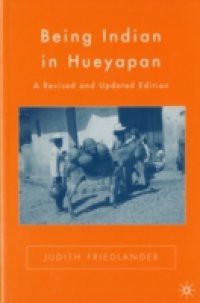When Being Indian in Hueyapan came out in 1975, it challenged commonly held ideas about culture and identity in indigenous Mexico, raising questions that remain as provocative today as they were over thirty years ago. Now in this revised and updated edition, Judith Friedlander places her widely acclaimed work in historical context. The book describes the lives of the inhabitants of an indigenous pueblo during the late 1960s and early 1970s and analyzes the ways that Indians like them have been discriminated against since early colonial times. After presenting the case as she saw it in 1975, Friedlander examines the relevance of her arguments for explaining the changes that have subsequently taken place over the intervening years, following the story into the twenty-first century, both locally in Hueyapan and nationally. Friedlander pays particular attention in a new final chapter to the role anthropologists have played in defining the so-called Indian problem and in finding solutions to it, most recently as advocates of indigenous rights. In the process, she takes a critical look at current debates about identity politics and the meaning of multiculturalism.

